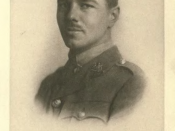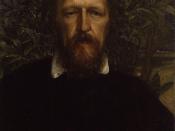'Dulce Et Decorum Est' by Wilfred Owen, compared to
'The Charge of the Light Brigade' by Alfred Lord Tennyson.
The poem 'Dulce et Decorum est', by Wilfred Owen, was a form of moral propaganda. Wilfred Owen's purpose in writing it was to convince the deluded British public that they had been lied to. He knew from first hand experience the terror, pain, horror and inhumanity of war; this made him feel disgusted and enraged at how different war was to the impression that men signing up to fight were given. He hated what men were put through in the name of 'justice', and his anger and contempt for those who upheld this notion of 'It is sweet and fitting to die for your country' is superbly voiced in this moving poem.
The poem tells of soldiers returning from the front line to 'distant rest', when they are hit by a gas attack.
One man is left helpless when he fails to get his helmet on in time. He dies an agonising death, which Owen tells that 'in smothering dreams' he sees this man die again and again, but cannot save him.
'The Charge of the Light Brigade' by Alfred Lord Tennyson was about a hopeless charge into 'the valley of death', where many of the 600 men died, all because of a fault in communications. Except this isn't how Tennyson presents the battle. He does not call it hopeless, but instead heroic. He barely mentions the 'blunder' in communications, but instead stresses how noble and well disciplined the soldiers were to follow the order to attack. Lord Tennyson never fought in the war, and he wrote the poem after reading about the charge in a newspaper. His intention was to make sure the men were never forgotten,


